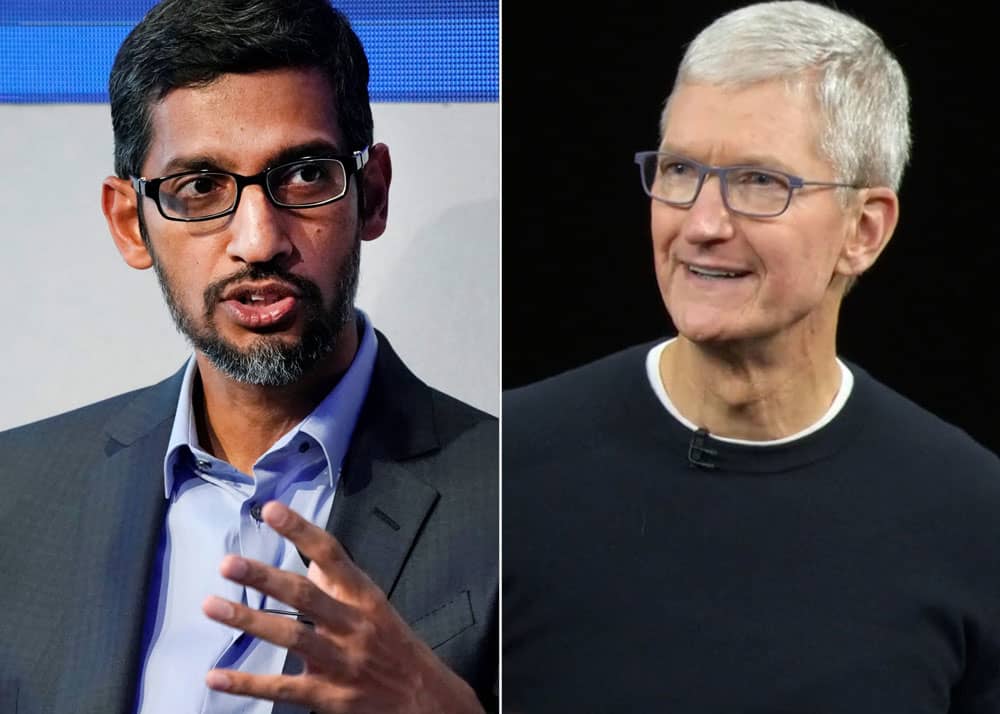
Sundar Pichai and Tim Cook
Source: Reuters; Apple
President Donald Trump issued an executive order on Thursday ordering U.S. firms to stop doing business with popular Chinese apps TikTok, owned by ByteDance, and WeChat, owned by Tencent.
This comes after Secretary of State Mike Pompeo said earlier in the week that he was calling on American app stores — which are dominated by Apple and Google — to remove “untrusted” Chinese apps.
“With parent companies based in China, apps like TikTok, WeChat, and others, are significant threats to personal data of American citizens, not to mention tools for CCP content and censorship,” Pompeo said in a briefing with reporters on Wednesday.
It’s unclear how the companies plan to implement the Trump administration’s executive order, which becomes effective on Sept. 20, or the State Department program. Representatives for Apple and Google didn’t respond to requests for comment.
But both companies have removed plenty of apps in response to foreign government requests. It may be unprecedented for the U.S. to ban apps on a national level, but other governments do it all the time.
Between July 2018 and June 2019, Apple removed 851 apps from its platforms in certain regions after legal requests from countries including China, Russia, Norway, and Saudi Arabia. When India banned TikTok and WeChat among other Chinese apps in June, the apps were removed from both the App Store and Play Store in that country within hours.
Apple CEO Tim Cook addressed app removals in China in 2017 by saying: “We would rather not remove apps, but like we do in other countries we follow the law wherever do we business.”
If the apps were to be removed from the U.S. stores, the vast majority of Americans would not be able to download TikTok, which was the No. 2 free app on Apple’s platform on Friday, nor WeChat, which is used by Chinese-Americans to stay in touch with family or friends with over 1 billion users worldwide.
China leads in App Store takedown requests
Although a wide variety of countries make requests, the leader by far in Apple’s stats is China, the target of Trump’s executive order.
According to Apple, China accounted for nearly three quarters of the takedown requests between July 2018 and June 2019, and 85% of the apps removed from Apple’s App Store during that time period. The “vast majority” relate to pornography, gambling, and illegal content, Apple says. Google’s Play Store is not available in China.
Activists in China have long pointed to Apple’s App Store as a choke point that prevents Chinese residents from accessing news or privacy apps from outside the country.
GreatFire, a nonprofit studying China’s national firewall, launched a site called Applecensorship.com in 2019 that tracks App Store removals in various markets, tallying its own numbers about app takedowns and removals that focuses on total removals, not just removals with official government requests.
In a letter to Congress last month, the group said that Apple uses its “walled garden operating ecosystem” to censor the App Store in China and around the world at the government’s behest.
In total, in the year-long period covered by Apple’s transparency reports, 15 different countries requested a total of 1,311 apps to be removed in 150 separate requests over “legal violations,” or alleging that the apps broke the law inside the country. Apple challenged all or part of 12 requests, and ultimately removed 851 apps from various country storefronts. 97 other apps were removed in the first half of 2019 when governments informed Apple that the apps broke Apple’s own store guidelines.
Apple doesn’t specify which apps were removed, but does provide limited detail about why the governments requested the takedowns. In most circumstances, they are related to illegal gambling or content, or violating privacy laws, according to Apple. In 2019, the U.A.E. requested Apple take down 275 apps for “operating outside of government policies.” Apple challenged the request, and didn’t take any apps down.
Apple’s stats currently cover July 2018 through June 2019, so it does not include this summer’s India takedowns.






